The Supporting Actresses for this Sunday are:
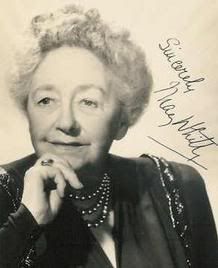
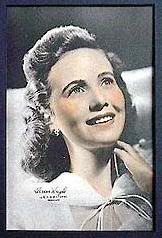
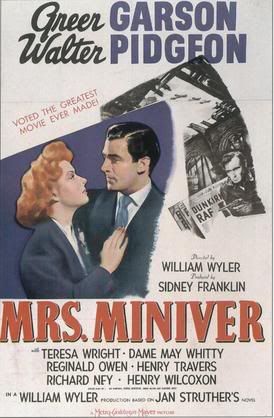
Mrs. Miniver is one of those movies -- the kind that Lulu's long known should be seen but could never quite get around to actually seeing. And, really, Lulu even knew a little something about the flick: Like -- Mrs. Miniver became the defining role of Greer Garson's career, that it was a beloved touchstone for women on the "home front" in WWII, and that 30-40-50-60 years later it still seemed to exist with a kind of "glow" around it. So, when it came time to hunker down & do Supporting Actress Sunday duty, StinkyLulu wasn't expecting much from this cinematic sacred cow -- just another super sentimental piece of patriotic pablum from the "Buy Your War Bonds" school of Hollywood filmmaking.
But boy sirree bob -- was Lulu in for a surprise.
Mrs. Miniver tells the story of Kay Miniver (Garson), the upwardly mobile British wife and mother whose life (& escalating shopping problem) is transformed when war comes to the British countryside in the early years of World War II. Mrs. Miniver reveals her true mettle as she (a) sees her eldest son to war; (b) sends her husband off to join a makeshift navy; (c) reads British literature to her children in a cozy, well-appointed bomb shelter; (d) captures a fugitive Nazi pilot in her kitchen; and (e) greets guests in a bomb ravaged parlor. Through all of the above, Mrs. Miniver -- via Garson's truly exceptional performance -- becomes the emblem for a new Britain, a kind of domestic war hero. The film makes the significance of this transformation manifest when a rose named for Garson's Mrs. Miniver wins -- in a symbolic upset -- a local flower competition. The rose becomes the film's metaphor for the plucky English spirit shared by all Britons in war-time, a spirit that traverses the social heirarchy (ie. obsession with cultivation and breeding) of English aristocratic society.
But what of the Supporting Actresses?
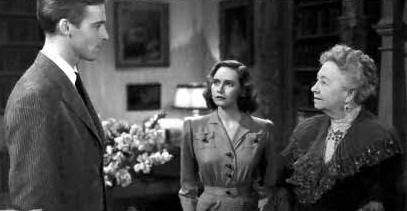
Well, Dame May Whitty (at right, above) plays the elitist old biddy, Lady Beldon, who just happens to the be the grandmother of the sweet young thing Carol Beldon played by Teresa Wright (at center), who ends up hitching up with Mrs. Miniver's impetuous son/soldier-to-be, Vin (Richard Ney, at left).
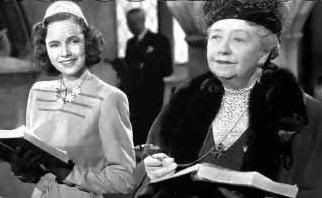
In the movie's first half, both Wright and Whitty offer what seem to be brilliantly precise stock characterizations of -- in turn -- the spirited ingenue and the domineering dowager. Indeed, for much of the film, Lulu considered Teresa Wright and Dame May Whitty to be deserving (if safe) nominees in a year with few female supporting performances. Each actress hit the notes -- comic, serious, romantic -- pristinely, channeling their considerable charisma through the characters (not over the top of them). Yet, as director William Wyler expertly winds this movie along its episodic way through the trials and travails besetting these characters, something more substantial starts to happen. Each of these women -- Teresa Wright, Greer Garson, May Whitty -- become archetypes of, respectively, the War Bride, the War Mother, and the War Widow. And, amazingly, rather than flattening the characters, each actress seizes this opportunity to grab the reins of the role, enriching her performance in ways that simply yanked tears from StinkyLulu's dryly cynical eyes.
Teresa Wright turns on this power in a short scene opposite Garson, where -- fresh back from her honeymoon with Garson's son -- the two Mrs. Minivers do an emotional reality check and, with an anguished passion that knocked Lulu back a little, Wright emphatically demands the right to experience joy with her new husband for "there'll be a lifetime for tears." Meanwhile, Dame May Whitty shows the kindly pots of sweetness hiding under the gnarled burls of her crusty dameness, while never sacrificing the humor that crucially informs the role. And in an extraordinary brief sequence atop the dais at the flower show, Whitty offers an emotional quick-change tour-de-force, displaying such a range of emotions -- well, Lulu stopped counting at 12.
In the first acts of Mrs. Miniver, Dame May Whitty and Teresa Wright give very professional, nearly palpable personas to their seemingly stock characters. Yet, as the plot deepens, they each provide an emotional depth and clarity that -- while plotted by the script -- are just that little bit beyond the call of duty. There is, simply, no reason why either actress had to be so good in these cookie cutter roles. But they were. And that's why this double whammy of Supporting Actresses both deserved the trophy. (That Teresa Wright took it home prolly results from her also being nominated in Best Actress that year, as well as Best Supporting the year before. That surplus of Oscar goodwill -- combined with a final act gotcha twist in Mrs. Miniver -- virtually assured Miss Wright of 1942's prize.)
But boy sirree bob -- was Lulu in for a surprise.
Mrs. Miniver tells the story of Kay Miniver (Garson), the upwardly mobile British wife and mother whose life (& escalating shopping problem) is transformed when war comes to the British countryside in the early years of World War II. Mrs. Miniver reveals her true mettle as she (a) sees her eldest son to war; (b) sends her husband off to join a makeshift navy; (c) reads British literature to her children in a cozy, well-appointed bomb shelter; (d) captures a fugitive Nazi pilot in her kitchen; and (e) greets guests in a bomb ravaged parlor. Through all of the above, Mrs. Miniver -- via Garson's truly exceptional performance -- becomes the emblem for a new Britain, a kind of domestic war hero. The film makes the significance of this transformation manifest when a rose named for Garson's Mrs. Miniver wins -- in a symbolic upset -- a local flower competition. The rose becomes the film's metaphor for the plucky English spirit shared by all Britons in war-time, a spirit that traverses the social heirarchy (ie. obsession with cultivation and breeding) of English aristocratic society.
But what of the Supporting Actresses?


Teresa Wright turns on this power in a short scene opposite Garson, where -- fresh back from her honeymoon with Garson's son -- the two Mrs. Minivers do an emotional reality check and, with an anguished passion that knocked Lulu back a little, Wright emphatically demands the right to experience joy with her new husband for "there'll be a lifetime for tears." Meanwhile, Dame May Whitty shows the kindly pots of sweetness hiding under the gnarled burls of her crusty dameness, while never sacrificing the humor that crucially informs the role. And in an extraordinary brief sequence atop the dais at the flower show, Whitty offers an emotional quick-change tour-de-force, displaying such a range of emotions -- well, Lulu stopped counting at 12.
In the first acts of Mrs. Miniver, Dame May Whitty and Teresa Wright give very professional, nearly palpable personas to their seemingly stock characters. Yet, as the plot deepens, they each provide an emotional depth and clarity that -- while plotted by the script -- are just that little bit beyond the call of duty. There is, simply, no reason why either actress had to be so good in these cookie cutter roles. But they were. And that's why this double whammy of Supporting Actresses both deserved the trophy. (That Teresa Wright took it home prolly results from her also being nominated in Best Actress that year, as well as Best Supporting the year before. That surplus of Oscar goodwill -- combined with a final act gotcha twist in Mrs. Miniver -- virtually assured Miss Wright of 1942's prize.)
.....
So -- four down & one to go for 1942. Be sure to tune in next Sunday, lovely reader, when StinkyLulu will comment on the final nominee for 1942, Agnes Moorehead in The Magnificent Ambersons.
Then, StinkyLulu will welcome the likes of TheFilmExperience & Nick'sFlickPicks & MainlyMovies for the 1942 Edition of The Supporting Actress Smackdown.
Be there.
(And, please, do be sure to vote for June's Supporting Actress Sunday roster. Lulu really does need your guidance, lovely reader. Without it Lulu'd be inclined to try to do them all & then Lulu's head would explode & that would just be unfortunate.)
So -- four down & one to go for 1942. Be sure to tune in next Sunday, lovely reader, when StinkyLulu will comment on the final nominee for 1942, Agnes Moorehead in The Magnificent Ambersons.
Then, StinkyLulu will welcome the likes of TheFilmExperience & Nick'sFlickPicks & MainlyMovies for the 1942 Edition of The Supporting Actress Smackdown.
Be there.
(And, please, do be sure to vote for June's Supporting Actress Sunday roster. Lulu really does need your guidance, lovely reader. Without it Lulu'd be inclined to try to do them all & then Lulu's head would explode & that would just be unfortunate.)

5 comments:
2 things--this turn of phrase:
...kindly pots of sweetness hiding under the gnarled burls of her crusty dameness
is brilliant. And
II have been completely laboring under the misconception that Agnes won this for her over the top performance in the movie only loved by film buffs. And a fascinating story--the novel won a Pulitzer in 1919 or something and was well-loved, and now is forgotten, much like the film in some ways. Innersting. Can't wait to hear what you think.
I'm a huge fan of Shadow of a Doubt, which led me to both Mrs. Miniver and The Magnificent Ambersons via Teresa Wright and Joseph Cotten respectively. Never thought about it in its film history perspective. I liked Mrs. Miniver better admittedly. Best Years of Our Lives fits with it really well because it's got a much different perspective on war brides but it's still Teresa Wright.
Anyway, this is a great post. I learned a lot.
just one bit --it's william wyler (one of my favs) who directed. not billy wilder. Those names always do get mixed up when one is typing fast (i've done it too...)
i thought Dame May Whitty was super in this film.
Duly noted. And corrected. Thanks.
I thought your observations of May witty were spot on and the garden party was everything you said it was...I actually reared up myself and I am a guy . I loved may witty and Greer garson's banter. Great movie...
Post a Comment